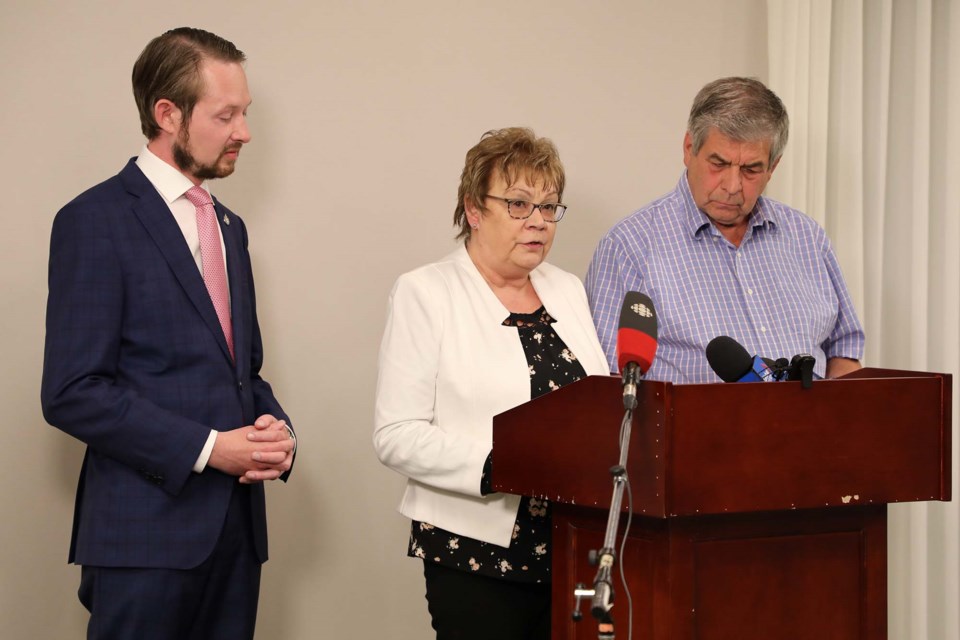It’s not an anniversary any parent wants to commemorate, but this year marks a decade since Mike and Dianne Ilesic’s 36-year-old son, Brian, was executed by his co-worker — a co-worker who might now be eligible for parole at an earlier date due to a top court ruling.
“Mike and I feel deflated,” said Dianne during a press conference on Tuesday.
On June 28, the Ilesics along with St. Albert-Edmonton MP Michael Cooper called on the federal government to act against a Supreme Court ruling that found the Protecting Canadians by Ending Sentence Discounts for Multiple Murders Act unconstitutional. They want the federal government to either invoke a notwithstanding clause or create new legislation.
The act, which passed in 2011, allowed judges to impose consecutive parole ineligibility periods on individuals convicted of more than one first- or second-degree murder.
Travis Baumgartner, the man who killed Brian, was the first multi-murderer to be sentenced to life in prison with no chance for parole for 40 years under the act.
Baumgartner, a former armoured car driver, killed his coworkers Ilesic, Michelle Shegelski, 26, Eddie Rejano, 39, and critically injured Matthew Schuman at the HUB Mall at the University of Alberta in a robbery on the evening of June 15, 2012.
Cooper said the message he took from speaking with the Ilesics is they felt some semblance of justice and reassurance knowing Baumgartner wouldn't be eligible to apply to parole for more than 40 years.
“Now, all of that is in jeopardy as a result of the Supreme Court's decision,” he said.
On May 27, 2022, the Supreme Court of Canada unanimously ruled the act unconstitutional in that it violated the Canadian Charter Rights and Freedoms in R. v. Bissonette.
“This provision 'authorizes a court to order an offender to serve an ineligibility period that exceeds the life expectancy of any human being, a sentence so absurd that it would bring the administration of justice into disrepute,'” wrote Chief Justice Richard Wagner on behalf of the Supreme Court about the decision.
Section 12 of the Charter guarantees the right of an individual to not be subjected to cruel and unusual punishment.
“By depriving offenders in advance of any possibility of reintegration into society, section 745.51 shakes the very foundations of Canadian criminal law,” Wagner said in statement about the ruling. The Supreme Court of Canada in R. v. Bissonette struck down consecutive parole ineligibility periods for multiple murders.
Alexandre Bissonette killed six people and seriously injured five others when he entered the Great Mosque of Québec armed with a semi-automatic rifle and a pistol and opened fire on the worshippers on Jan. 29, 2017, according to the Supreme Court of Canada website.
Under the act, Bissonette would have served six consecutive parole ineligibility periods of 25 years, for a total of 150 years. However, the courts found this unconstitutional and sentenced him to five of the 25-year sentences concurrently, as well as 15 years for the sixth first-degree murder to be served consecutively, for a total ineligibility period of 40 years.
Bisset appealed his sentence to the Quebec’s Court of Appeal and was sentenced to serve the six sentences concurrently, for a total ineligibility period of 25 years.
Cooper said Justice Minister David Lametti only offered hollow words of sympathy for victims of crimes after the Supreme Court decision. He wants to see the government introduce legislation so there is an enhanced role and eligibility period in the case of multiple murders.
As reported by the CBC, Lametti said they do support a longer period of parole ineligibility, but they will respect the Supreme Court of Canada’s decision and will not be invoking a notwithstanding clause, which would allow a temporary override on sections of the Charter of Rights and Freedoms.
Cooper said he would also like the government to look at whether those convicted of multiple murders should be eligible to apply for parole every year after they serve their 25 years.
“The uncertainty, the trauma of having to see the perpetrator to attend parole hearings is real. And it impacts victims’ families, and that needs to be taken into account and addressed,” he said.
Dianne said every year on the anniversary of Brian’s murder they go to the HUB Mall.
“We come with flowers. And we light a candle. We put some memories at the TD machine — the area where they got shot …Then we go to the grave site. Usually, our family joins us.
“It's not all gloom and doom. There are some things that happened in Brian's life that we laugh about. So, it's not a gloom day … It's a way to celebrate his life.”




